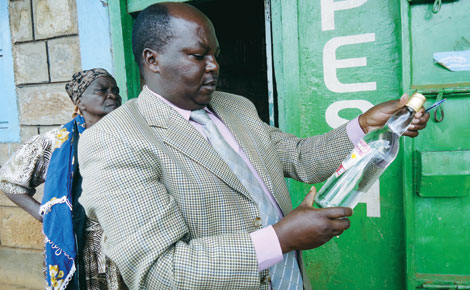×
The Standard e-Paper
Smart Minds Choose Us
 |
| Interdicted Kigumo deputy county commissioner Albanso Ndiso examines one of the killer brew seized by police officers at Kirere market. [PHOTO: BONIFACE GIKANDI/STANDARD] |
By JAMES MBAKA
Kenya: Kenya has more than 2,000 brands of cheap and potentially deadly alcoholic drinks, it emerged Friday as five more people died from consuming brews laced with methanol. This raises the death toll to about 90.